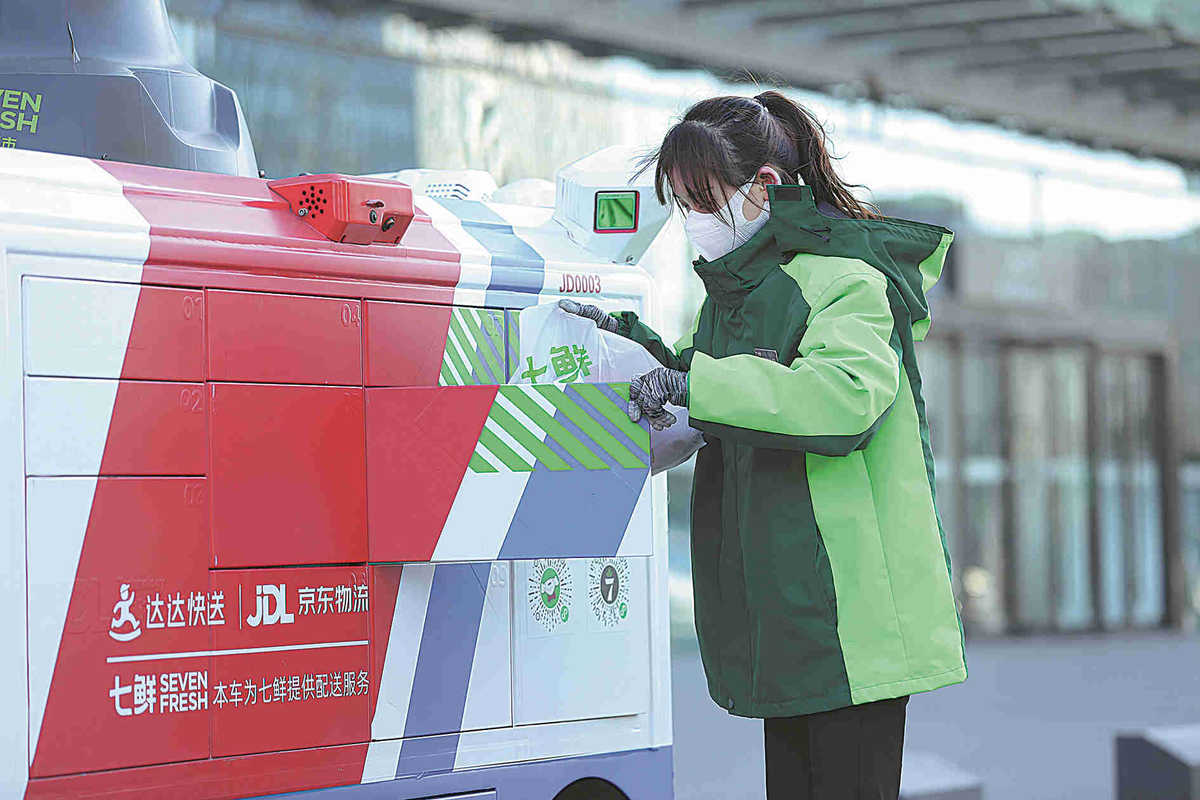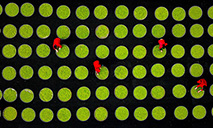Driverless delivery vehicles transform grocery trade

Online orders are loaded into an autonomous delivery vehicle by a Seven Fresh staff in Beijing in February. CHINA DAILY
Late last month, Zhang Qian, 27, who works as an accountant with an internet company in Yizhuang, a southern suburb of Beijing, picked up her take-out orders without any human interaction from an unmanned four-wheeled delivery vehicle that appeared at the gate of her community, and got first-hand experience of a new era for consumers.
She received her order in about 20 minutes from the time of placing it online. She bought fresh vegetables, fruit, seafood, meat, cooking oil, rice, seasonings and other groceries through an app. After that, she received a text message informing her the delivery vehicle was about to arrive. And then, the driverless vehicle materialized with her groceries.
Like Zhang, hundreds of millions of Chinese consumers would vouch for the efficiency and reliability of unmanned delivery vehicles, a new form of surface transport, now being employed by fresh food retail firms for making door deliveries.
Navigated by radar and sensors, a typical unmanned delivery vehicle automatically calculates optimal routes and avoids barriers and pedestrians. It sends messages to the recipient concerned when approaching final destinations.
A string of Chinese technology companies have been at the forefront of adopting driverless delivery vehicles to enhance logistics efficiency, reduce logistics costs and improve service efficiency and user experience.
Dada Group, one of China's largest local on-demand delivery and retail platforms, is accelerating steps to expand its unmanned delivery network, in collaboration with JD Logistics, the logistics arm of e-commerce giant JD, and White Rhino, an autonomous delivery vehicle developer.
The company said its autonomous delivery open system has already been adopted by Seven Fresh, JD's supermarket chain, Yonghui Supermarket and Walmart's Sam's Club, as part of a broader drive to normalize the scalable use of unmanned delivery vehicles for on-demand delivery service.
The system can distribute orders automatically for supermarkets, manage package loading, maintain the normal operations of orders through its human-machine interaction technology, as well as dispatch the unmanned vehicles and plan routes to ensure the latter efficiently fulfill online orders.
"Since the open platform was officially launched in July 2021, we continue to empower upstream and downstream partners in the unmanned delivery value chain through technology and operational support," said Philip Kuai, founder, chairman and CEO of Dada Group.
At present, the platform has delivered over 30,000 orders for supermarket partners. Meanwhile, its delivery fulfillment rates remained stable at over 95 percent even during promotion gala and inclement weather, Kuai said.
Demand for online grocery delivery services is growing fast in China. According to a report based on a survey conducted by market consultancy iResearch, consumers are increasingly embracing on-demand consumption, with fruit and vegetables, dairy products, meat and eggs figuring among the most commonly purchased categories.
Compared with traditional delivery, unmanned delivery features lower delivery costs, larger carrying capacity and higher safety for one-hour delivery. It also provides a viable alternative to address some challenges, such as rising labor costs and a shortage of couriers, experts said.
"At present, unmanned delivery services have been deployed in some designated areas and scenarios, such as hotels, supermarkets and universities, considering the limitation of the current autonomous driving technologies and complicated traffic situations," said Lu Zhenwang, CEO of Shanghai-based Wanqing Consultancy.
Noting the application of driverless delivery vehicles could boost delivery efficiency and reduce costs, Lu said Chinese tech giants have invested massively in the intelligent logistics sector to gain the upper hand amid fierce competition.
Local services company Meituan launched its new-generation driverless delivery vehicle in Beijing's Shunyi district last year, which can carry 150 kilograms of goods, travel up to 20 kilometers per hour and react to obstacles within a radius of 150 meters.
The company planned to use the unmanned vehicles to deliver groceries in Beijing and Shenzhen in the next three years. By the end of last year, Meituan had finished nearly 190,000 orders for customers from over 20 residential communities in Shunyi district by utilizing autonomous delivery vehicles.
In addition to autonomous vehicles, drones have been used for deliveries. JD has stepped up efforts to apply drones to logistics and delivery activities. The Beijing-based company used drones to deliver online purchases to rural shoppers in Jiangsu province in 2016, kicking off the e-commerce giant's use of unmanned aircraft for distribution purposes.
During the peak of the COVID-19 pandemic in China, JD completed delivery of daily necessities to a village along the shores of Baiyangdian Lake, Hebei province, using a drone. It took the drone just a few minutes to fly about 2 km over the lake to a village on the other side.
Pan Xuefei, a senior analyst at market research firm IDC, said the application of drones for delivery services is still at an initial stage, and they are mainly used to improve delivery efficiency in some remote mountainous areas and sparsely populated areas.
Photos
Related Stories
- Driverless technology used in highway construction in NW China’s Gansu
- China’s driverless high-speed rail on trial: World Intelligence Congress
- Driverless mini bus tested on open road in Helsinki
- China to issue national standard for driverless technology
- Internet businessman proposes support for driverless cars
- China's first driverless subway train on display
Copyright © 2022 People's Daily Online. All Rights Reserved.










